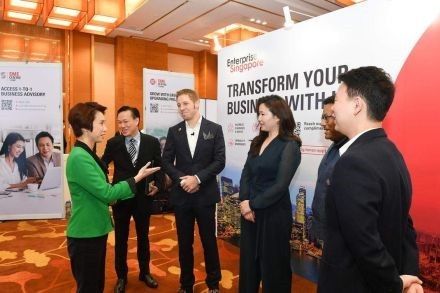
THE drive for sustainability is revving up. The Enterprise Sustainability Programme (ESP), with support from Enterprise Singapore (EnterpriseSG), has rounded up more than 300 local small and medium-sized enterprises (SMEs) to take part in awareness and education programmes. More than 40 sustainability-related projects are also being developed.
The ESP, launched last October, has a robust range of support schemes to help SMEs embrace sustainability and to be part of the “emerging green future”, said Low Yen Ling, Minister of State for Trade and Industry, at the SME Centre Conference on Wednesday (Aug 31).
First announced at Budget 2021, the ESP plans to benefit at least 6,000 enterprises until 2025 and has S$180 million set aside for it.
Low said: “It (ESP) will be relevant for your company, no matter its size or stage of development.”
Separately, the recently launched Energy Efficiency Grant, which provides SMEs from the food services, food manufacturing and retail sectors with funds to adopt energy-efficient equipment for their business, will start accepting applications from eligible companies from Thursday (Sep 1), she added.
SMEs that are new or in the early stages of their green journey can start by building their awareness and knowledge of sustainable practices through the ESP. Subsidised training courses have been organised for them by EnterpriseSG, in partnership with Global Compact Network Singapore, PwC Singapore and the Singapore Environment Council.
In the area of funding, SMEs can tap additional support, such as the Enterprise Financing Scheme – Green, to access financing for capability-building projects or new sustainable solutions.
One company which has benefited from the ESP is local private bus operator, Yeap Transport, which developed a sustainability road map to achieve net-zero carbon emissions, for example, by turning its bus fleet electric. It has also undertaken a climate strategy and footprint study to measure its Scope 1, 2 and 3 carbon emissions. (Scope 1 emissions are from direct, controlled sources such as combustion of fossil fuels within a facility; Scope 2 emissions are from purchased energy consumption, and Scope 3 emissions are indirect emissions, often by suppliers or partners.)
In 2021, a network of 11 dedicated SME centres assisted over 28,000 enterprises, including by helping them adopt sustainability standards and implement sustainability projects through the ESP, Low noted.
“As SMEs go green with more sustainable practices, we are also giving them a helping hand,” she said. “The government is committed to seeing our SMEs grow in Singapore and beyond. We will certainly not hesitate to do more and whatever is necessary to support our SMEs well into the future.”
Under the ESP, both EnterpriseSG and Schneider Electric announced in a separate statement on Wednesday that they are collaborating on the “SME Kickstarter Decarbonisation Programme”, a mentorship programme by Schneider Electric spanning 3 years. Some 100 SMEs are expected to benefit from this programme to equip them with the “necessary knowledge and guidance needed throughout their sustainability journeys, with a focus on decarbonisation”.
Speaking toThe Business Times, Kim Yoon Young, cluster president of Singapore, Malaysia and Brunei at Schneider Electric, said that the mentorship will involve a 3-step process to show SMEs how they can strategise, digitalise and decarbonise.
The mentorship will explore potential sources of renewable energy, and how these SMEs from across the industry can actively reduce and use the energy required for business operations in a smart way, he added.
“It’s not just about training ... It’s a 3-year mentorship and this comes with not only aspects of sharing knowledge, but also bringing technology as well as showing how this (technology) is operated in different environments, different industries, or different buildings, and monitoring very closely, the evolution of the progress,” Kim said.
Source: https://www.businesstimes.com.sg/government-economy/enterprise-sustainability-programme-benefits-over-300-local-smes-40-projects

